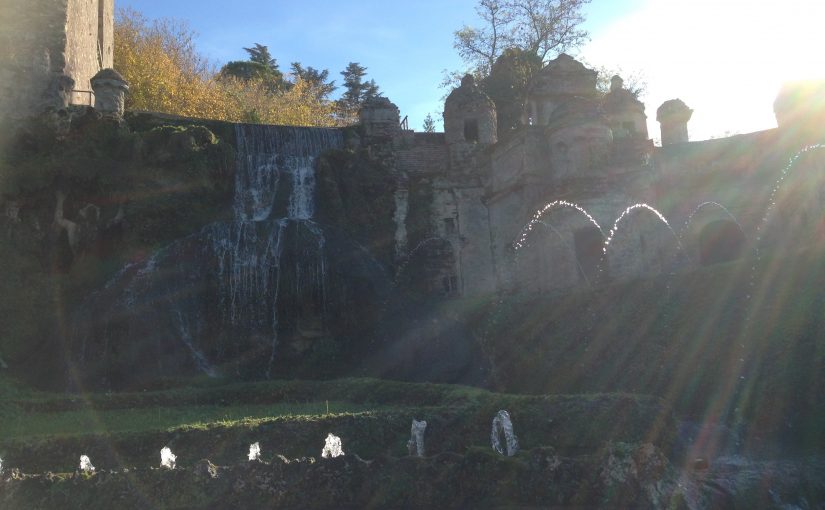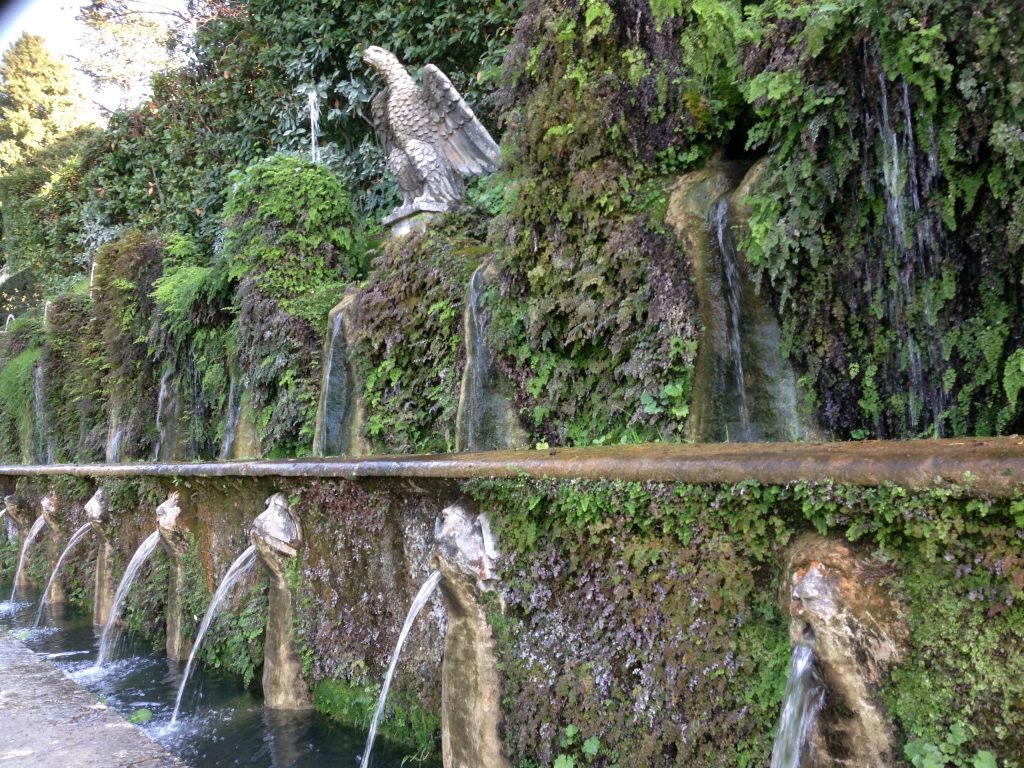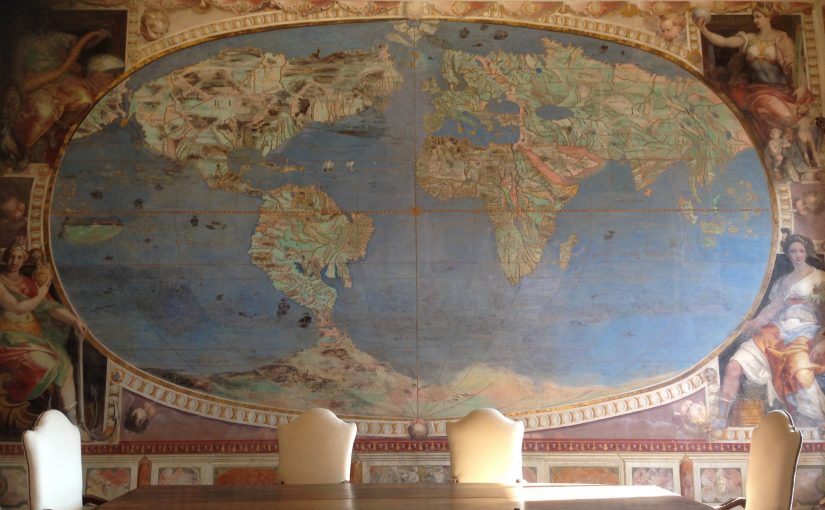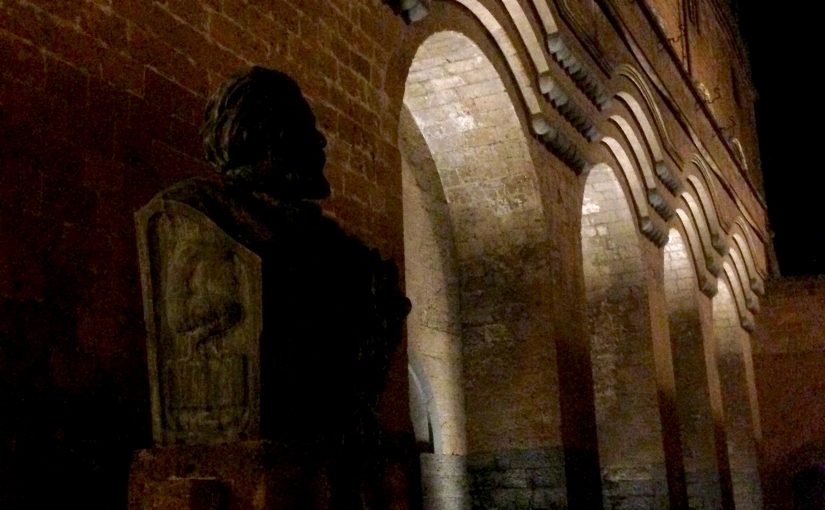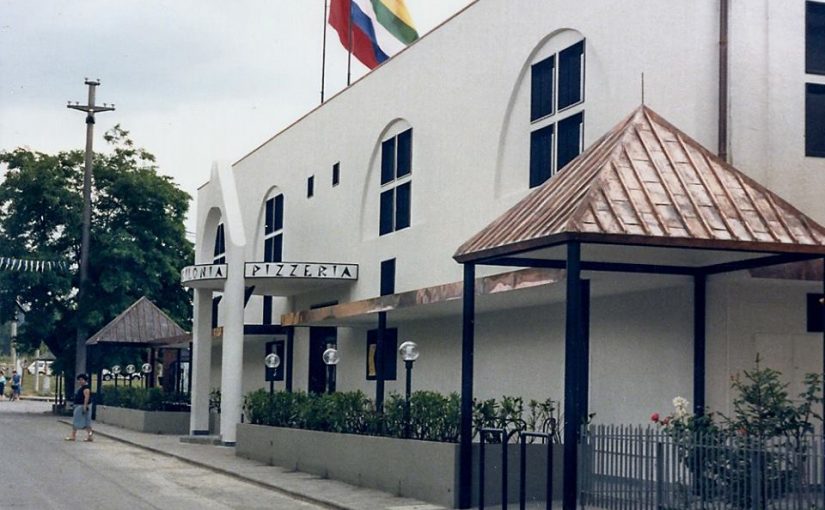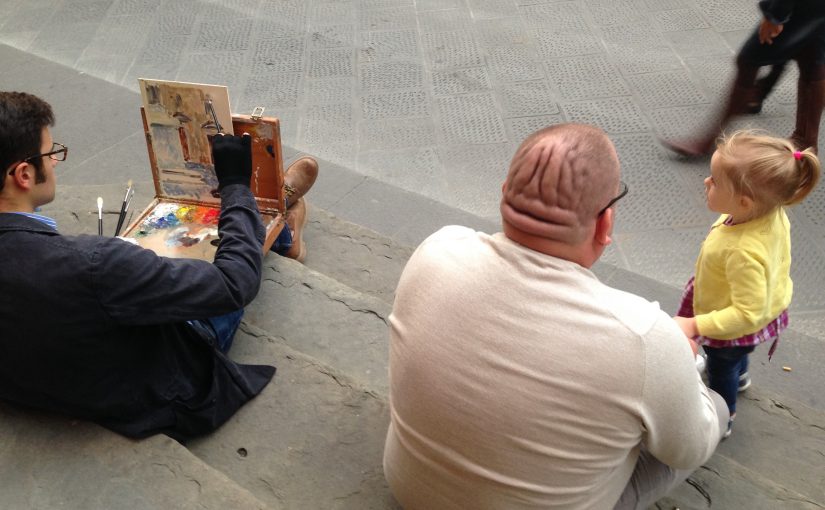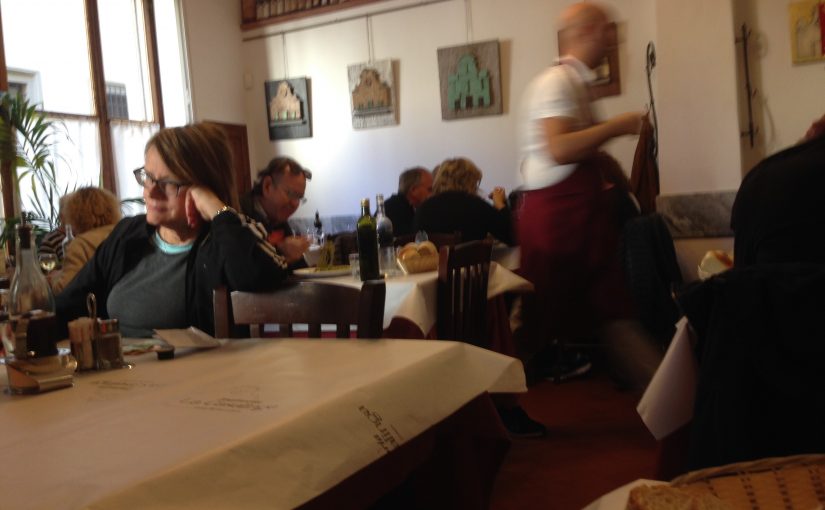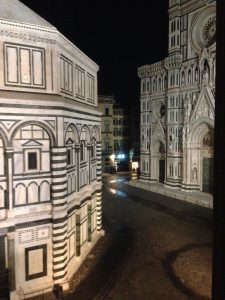A friend of mine here has no choice but to shortly move back to the States in order to resolve personal matters, and is eager to experience as much of Italy as she can in the interim. Because I have a difficult time, both logistically and emotionally, of ever leaving Orvieto, we’ve become mutually companionable travel chums. Today was projected to be sunny, so she suggested we tour Villa d’Este in Tivoli, east of Rome. It would be her fourth visit to the Villa and its water gardens – my first.
A couple of weeks ago we took an day in Caprarola to see Palazzo Farnese. After wandering the cardinal’s humble residence and gardens (insert an ironic twist on the word “humble”) we sought lunch in town. The first place we came to seemed closed, but Catherine knocked anyway, and we were invited in to one of the best meals either of us could remember having. At its conclusion, Natale, the restaurant’s owner, recommended we check out the nearby church of Santa Maria della Consolazione. He pointed to a opening between buildings across the street. “You’ll turn right, go down a few steps under an arch, enter a small piazza, and the church will be straight ahead. You can’t possibly miss it. If it’s locked, go to the pasticceria across the piazza and ask the guy there for a key.”
Improbable as it may seem, that is exactly what we did.
The church is lovely with a richly carved wooden ceiling, paintings, and elaborate stucco work. Towards the end of our twenty or so minutes, we were joined by the ladies of its altar society come to decorate for Sunday mass. Each one looked familiar.
My mother was president of her altar society for thirty years, and I came to know the ladies quite well, having volunteered for twenty of those years to decorate for Christmas. My mother’s flock were all first-generation American, who if questioned about their backgrounds, associated with their immigrant roots before anything else. From those roots, sprung exotic flavors my generation never tasted, until we sought them out, ourselves — a quest that has dominated my adulthood.
So, this morning at nine, Catherine and I set off for Tivoli, eager for another adventure, another good lunch, another unexpected key to something. Tivoli is not far from Orvieto, about an hour forty minutes. At close to the halfway mark, the GPS warned us of an accident ahead, but warned too late for us to do anything to avoid it. As predicted, traffic began to slow, and five or six kilometers later, came to a halt. Then, something very Italian happened.
There is an aspect of Italian culture I attribute to residents of this peninsula having had to make the best of whatever circumstances they’ve been presented with for centuries on end; disasters of every kind, both man-make and natural. So, their reaction to inconvenience, like stopped traffic, is particularly accepting; a sort of “hey, we got off easy this time, let’s have fun!”
Once it became clear that this was going to be more than a brief interruption, about a third of the people left their cars to joke with each other, to trade opinions, personal information, a few of them smoked. The young father from the car in front of us walked ahead, sought news from up the line, shared it, returned to his car, made goofy faces at his daughter through the back window, then circulated again to tease and remark with those around him. He seemed to be having a great time, as, frankly, did everyone we saw strolling the autostrada this morning. It became, for a few minutes, a piazza, and the stalled traffic was interpreted as permission to promenade with strangers.
My travel companion correctly sized up the situation that had caused the interruption. Traffic in both directions had been stopped, she predicted, to allow for an air evacuation. Moments later, a helicopter lifted off a kilometer or so ahead of us. Those standing outside, looked up to watch. Her next observation was that debris would have to be cleared, and hard upon those words came a kind of platform truck used for that purpose. The assembly pivoted to note its passing. Then large rigs crept forward ever so slightly. Everyone instantly understood that the creeping promised movement – signs having been spied more easily from an elevated cab than from the level of a passenger vehicle – and into their cars they climbed. Almost immediately, the lanes flowing against us began to fill, and shortly after that, our lanes moved forward, albeit more slowly. We passed a car that had pierced the guard rail, badly shattered but alone, a few minutes later. “Heart attack,” I posited. “Or a text message,” Catherine countered.
The gardens of Villa d’Este are astounding. I read their history aloud, as put forth on Wikipedia, on our way there – all the names and layers of artists and patrons who contributed to their creation. But once there, I was reminded of the Italian response to traffic jams, surprisingly good lunches, and church keys. The gardens are a joyous and jubilant manifestation of a highly evolved ability to play, to make magic from basic things.
Water flows everywhere; rushing in channels, shooting up through nozzles, cascading into ponds and pools, falling over precipices. There is no machinery to propel or pressure this hydraulic miracle, it relies only on gravity and the ingenuity of its designers.
The Avenue of a Hundred Fountains features faces (a hundred? I didn’t bother to count) of animals, vaguely human, spitting water, each one unique. I couldn’t help but imagine what fun the stone masons must have had in carving them; faces that perhaps reflected those they saw in Tivoli’s piazzas, perhaps the angry faces of people inconvenienced by the garden project or outraged by the local cardinal’s repeated abuse of power, people who brought suit against him (unsuccessfully), who fumed and cursed at the foreign artisans who had invaded their lovely town, a town perched on a hillside overlooking Hadrian’s equally extravagant villa of a thousand years before which was quarried by the Este to augment their own glory.
Today is, as I was told, Italy’s first Black Friday, um… weekend. Of all the useless things to import, that is, by my lights, the crowning stupidity. Upon our return to Orvieto, my friend needed to pick up a few items at the Coop, a large, sleek, white, supermarket in a small mall in Orvieto Scalo. The place was packed. The lines were long and slow, so Orvietani transformed them into little social clubs, just as their countrymen had done this morning with stalled traffic. A stage had been set up in the common area that promised music or stories, I couldn’t tell which. Families crowded the lobby and transformed it into an indoor piazza. Its commercial function grew lighter, less sterile, more socially useful.
My friend reported that there were cheap televisions being hyped into bargains, within, and those manipulations had caused manic behavior in a few of the customers. Nothing can offset the corrosive influence of consumerism, not entirely. And that this culture has found ways of countering the lies of the powerful with a kind gesture, a shrug, or a smile, does not prevent rude individuals, abrasive moments, or partisan delusion.
But, again and again, I am struck by a talent people here take utterly for granted; the talent for making life not only tolerable, but joyous, by the giving of their major attention to little things, things that are clever, beautiful, delicious. All the manipulations of the modern world fall helplessly at the feet of this sort of behavior, if not always or forever, at least for an eternal moment or two. And when we, who have invaded their towns and cities, can see them with the same eyes with which they regard stalled traffic or angry faces, we are graced with a glimpse of freedom as radiant as a stream of water dancing in the sun.
